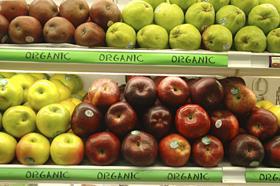
Organic fresh produce sales are continuing to hold their own, but joy at more shoppers buying in is being tempered by uncertainty around Brexit.
Nielsen Scantrack figures released by the Soil Association for the 12 months to the end of June 2018 show organic fresh produce sales have risen 5.3 per cent, ahead of both the wider grocery market and organic sales in total, which were up four per cent. That represents seven consecutive years of growth for the category.
Research by the Soil Association suggests the reason for the increase lies with the prominence consumers put on ‘healthiness’ and ‘taste and inspiration’, with younger demographics in particular identifying organics as a signifier of health.
The trend towards reduced meat consumption and the rise in vegetarianism is also likely to have helped.
“We know that interest in organic food has been growing in recent years and it’s great to see farmers continue to be rewarded for growing food as it should be, with no artificial additives, fewer pesticides, no GM and with the highest standards of animal welfare,” said Soil Association head of farming Liz Bowles.
The Soil Association will shortly launch its annual promotional drive, Organic September, which aims to boost awareness and shine a spotlight on organic producers under the strapline ‘Food as it should be’. The sector is also getting a lift from the launch of the British Organic Carrots group and associated marketing push, which kicks off this month.
So there is much optimism from a marketing and sales perspective, but the mood of positivity is being subdued by uncertainty over Brexit, with the government revealing in late August that exports of organic food to the EU could be prohibited for up to nine months in the event of a no-deal Brexit, and packaging will have to change.
According to a government technical notice, the UK will become a third country if no agreement is reached by 29 March 2019, meaning UK businesses would only be able to export to the EU if they were certified by an organic control body recognised and approved by the EU.
To achieve that recognition, UK control bodies would need to apply to the EC, but would not be able to do this until the UK has left the union. The process can take up to nine months, though the British government said it is exploring ways to speed up the process.
“As we are retaining EU regulation in UK law, we expect to negotiate an equivalency arrangement with the EU which will allow the free movement of organic goods between the EU and the UK,” Defra said.
Current EU legislation around organic food is expected to be rolled into UK law, with no plans to introduce major policy changes. However, anew UK-owned imports traceability system would replace the current EU TRACES NT system to ensure the traceability of organic food and feed. Defra has promised to release more information on the new system in the coming weeks.
Logos on organic packaging would also need to change, as UK suppliers and retailers would no longer be allowed to use the EU organic logo, with a grace period to use up existing stock.Defrarevealed it has commissioned research on organic logos used worldwide, which will provide evidence for developing any future UK logo.
The Soil Association dismissed the technical notice as offering “no further clarity” or helpful advice to businesses about how to prepare.



